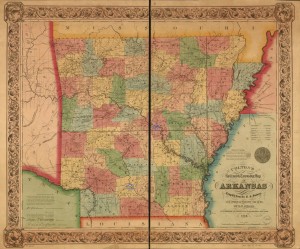On January 8, 1864 “Seventeen-year-old David O. Dodd is hanged as a Confederate spy in Little Rock, Arkansas.”[1]
David Owen Dodd was caught with sensitive documents on his trip from Union-occupied Little Rock back to his family in Camden, Arkansas. The federal army took Little Rock in September 1863 and Confederate troops retreated to the southwest of the state. David O. Dodd was called the “Boy Martyr of the Confederacy” because he refused to tell the Union authorities the source of his information and was hung as a result.
From the Richmond Daily Dispatch March 23, 1864:
Execution of a Confederate.
–David Owen Dodd, aged seventeen, son of a merchant of Little Rock, Ark, was executed by the Federal military authorities there, a few weeks since, as a spy. A letter says:
Mr. Dodd had a short time previous to the execution of his son removed his family to [from] Little Rock, and had sent his son back on business. While there he gained important information in regard to the garrison and defences of the city, and had noted them in telegraphic characters in his memorandum book. On his way to Camden he was by a Federal scout, who searched him and found the fated book. He was taken to Little Rock, tried by court martial, and sentenced to be hung as a spy. Previous to his execution, Gens. Steele and Davidson both conversed with him, assuring him of their sympathy on account of his extreme youth. And as they knew some one intimate about their headquarters had given him the information, they proffered to release him on condition he would divulge the name of his informant. This he scorned to do, saying if a wrong had been committed he was the guilty one, and “that a man that would not die for his principles was not ” When brought to the ascended it, calmly pulled off his coat and met his fate without a shudder. Two hours before his execution he wrote with a steady hand his “last letter” to his parents and sisters, telling them not to weep for him, but to meet him in Heaven. Seldom do such instances of pure, disinterested patriotism occur.–Never will a grateful people forget the memories of the noble dead who have freely offered that to lives for their country, and there are none whose names will be more gratefully embalmed than the subject of this memoir. Rather than betray his friends, he preferred death, and thereby crowned his name with immoral [sic] bonnet.
You can read his “last letter” from 1:00 AM 150 years ago today and a long account of the incident at knowsouthernhistory. You can also find his grave.
The map here shows the extent of the Union occupation of Arkansas in January 1864.
- [1]Fredriksen, John C. Civil War Almanac. New York: Checkmark Books, 2008. Print. page 388.↩


